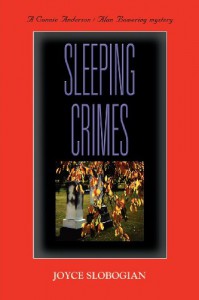
Sleeping Crimes

I am a HUGE fan of mysteries - any night if you ask me what I'm watching, most likely it's some sort of British mystery (they are my favorite); Agatha Christie is one of my all time favorite authors (Hercule Poirot, Miss Marple, Tommy & Tuppence ... I just can't get enough); I have seen (and read) every Sherlock Holmes story there is; and I have a huge selection of mysteries on my Kindle (and on my bookshelves). Mysteries were some of the first real books that I got into when I was young, after LotR at 10 years old and cookbooks, that is. There is just something about this genre that really gets my blood pumping and my brain working. I love trying to find out if I can figure out who did it before they do (and Hercule stumps me EVERY time).
This, as a mystery, isn't half bad. It starts off with a little story that tells you how some of the characters from the past are connected, then pops ahead to ten years later when one of those characters, Eric Delaney, a now famous author of books that tell people's secrets, comes back to town to tell the secrets he knows. He makes it very clear to people that he knows a secret and plans it to be the topic of his next book.
Sounds interesting, huh?
Even though it reminds me of an episode of Murder, She Wrote I've seen a couple of times, I was pulled right in.
As the story goes on, one of the people from ten years before (Connie) is now two years into a relationship with a police officer, one of the police officers on the case, but it is quickly proven that she couldn't have possibly done it. And with her help, the police work the case to discover what happened ten years ago and who murdered Eric.
So, you're wondering why I gave it a 3, huh? I am too. Because in my head I'm thinking that it deserves more like a 2.
Now I'm sure you're wondering, 'But why, Meghan, if you liked it?'
Because of one KEY point that drove me absolutely crazy.
At about 50% into the book (more like 47%, but who's counting?), Connie finds a piece of evidence. WHERE? In a place it couldn't possibly have been. I know what you're asking - but how do I know that for sure. Because they spent quite a bit of time on the evidence and, according to the story, it just wasn't there. Continuity, especially in a mystery, is key. How can I believe anything else in the story if I can't even believe the evidence?
I actually almost quit there. But ... I'm one of those people that can't stop a book once I'm into it. And, to be honest, I wanted to know who the murderer was.
But all I could keep thinking about was the evidence that couldn't have been there.
I also want to note as a side thing, which really has nothing to do with the novel and the review, but I have a serious issue with the description of this book and am actually quite glad that I didn't read it beforehand. What is the point of telling me almost the WHOLE story in the description? I don't know about other people, but if I had read this particular description, I never would have read the novel. It gives away too much, in my opinion, for me to fully enjoy the story - I would have been anxiously waiting for each thing to occur. Shame on you, Book Description, shame on you.
(As I say with all reviews where I have a major issue, if the author would like to contact me to discuss this further, she is more than welcome to do so.)
Note: I received a copy of this book in exchange for my honest review.
 1
1
 7
7








